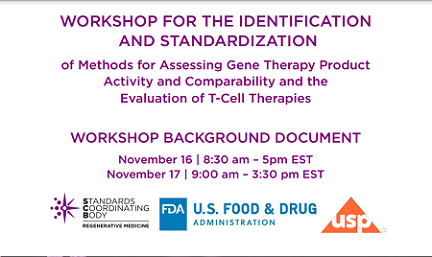The United States Pharmacopeia (USP) hosted a pivotal workshop on November 16 and 17, 2023, at its headquarters in Rockville, MD. This event brought together key participants from the regenerative medicine community with the objective of advancing the field through the development of standards for T-cell therapies and gene therapy product activity. Yulia MERKULOVA, leading researcher, and Nelya KYSHYNETS, senior researcher, respectively, of the Ukrainian Scientific Pharmacopoeial Center for Quality of Medicines joined the event online.
The workshop was an integral part of the ongoing efforts initiated by the 21st Century Cures Act, aimed at accelerating medical product development. It was supported by the Standards Coordinating Body for Gene, Cell, and Regenerative Medicines and Cell-Based Drug Discovery (SCB) in line with the U.S. Food and Drug Administration’s (FDA) mission to foster medical advancements.
Key activities and outcomes of the workshop included:
Identifying Standards Needs: Participants worked on pinpointing specific standards necessary for assays in T-cell therapies and gene therapy product activity. This aimed at guiding future development in advanced therapies.
Sharing Challenges and Best Practices: The event served as a platform for sharing community challenges and best practices related to the assessment of cell and gene therapy products.
Learning about Standards: Attendees gained insights into the benefits of standards, the development process, implementation, and existing regenerative medicine standards.
Feasibility Assessment and Next Steps: The feasibility assessment confirmed the potential for developing standards in this area. The workshop’s next steps include conducting surveys, developing a white paper, assembling a working group, and discussing the creation of a standard.
Future Plans: Goals set for 2023-2024 include stakeholder engagement, expert collaboration, and formalizing plans to advance the standard within a specific Standards Development Organization (SDO).
This workshop marked a significant stride towards standardizing and enhancing the efficacy of gene therapy and T-cell therapy assessments, contributing substantially to the progress of regenerative medicine.



